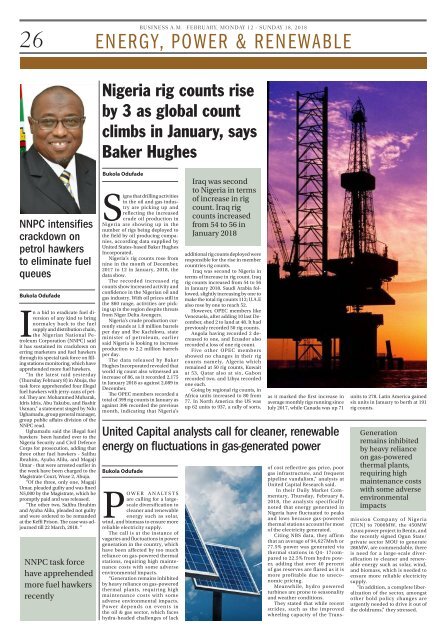12-02-2018
Create successful ePaper yourself
Turn your PDF publications into a flip-book with our unique Google optimized e-Paper software.
BUSINESS A.M. FEBRUARY, MONDAY <strong>12</strong> - SUNDAY 18, <strong>2018</strong><br />
26 ENERGY, POWER & RENEWABLE<br />
Nigeria rig counts rise<br />
by 3 as global count<br />
climbs in January, says<br />
Baker Hughes<br />
NNPC intensifies<br />
crackdown on<br />
petrol hawkers<br />
to eliminate fuel<br />
queues<br />
Bukola Odufade<br />
In a bid to eradicate fuel diversion<br />
of any kind to bring<br />
normalcy back to the fuel<br />
supply and distribution chain,<br />
the Nigerian National Petroleum<br />
Corporation (NNPC) said<br />
it has sustained its crackdown on<br />
erring marketers and fuel hawkers<br />
through its special task force on filling<br />
stations monitoring, which have<br />
apprehended more fuel hawkers.<br />
“In the latest raid yesterday<br />
(Thursday February 8) in Abuja, the<br />
task force apprehended four illegal<br />
fuel hawkers with jerry-cans of petrol.<br />
They are: Mohammed Mubarak,<br />
Idris Idris, Abu Yakubu, and Bashir<br />
Usman,” a statement singed by Ndu<br />
Ughamadu, group general manager,<br />
group public affairs division of the<br />
NNPC read.<br />
Ughamadu said the illegal fuel<br />
hawkers been handed over to the<br />
Nigeria Security and Civil Defence<br />
Corps for prosecution, adding that<br />
three other fuel hawkers - Salihu<br />
Ibrahim, Ayuba Alilu, and Magaji<br />
Umar - that were arrested earlier in<br />
the week have been charged to the<br />
Magistrate Court, Wuse 2, Abuja.<br />
“Of the three, only one, Magaji<br />
Umar, pleaded guilty and was fined<br />
N5,000 by the Magistrate, which he<br />
promptly paid and was released.<br />
“The other two, Salihu Ibrahim<br />
and Ayuba Alilu, pleaded not guilty<br />
and were ordered to be remanded<br />
at the Keffi Prison. The case was adjourned<br />
till 22 March, <strong>2018</strong>. “<br />
NNPC task force<br />
have apprehended<br />
more fuel hawkers<br />
recently<br />
Bukola Odufade<br />
Signs that drilling activities<br />
in the oil and gas industry<br />
are picking up and<br />
reflecting the increased<br />
crude oil production in<br />
Nigeria are showing up in the<br />
number of rigs being deployed to<br />
the field by oil producing companies,<br />
according data supplied by<br />
United States-based Baker Hughes<br />
Incorporated.<br />
Nigeria’s rig counts rose from<br />
nine in the month of December,<br />
2017 to <strong>12</strong> in January, <strong>2018</strong>, the<br />
data show.<br />
The recorded increased rig<br />
counts show increased activity and<br />
confidence in the Nigerian oil and<br />
gas industry. With oil prices still in<br />
the $60 range, activities are picking<br />
up in the region despite threats<br />
from Niger Delta Avengers.<br />
Nigeria’s crude production currently<br />
stands at 1.8 million barrels<br />
per day and Ibe Kachikwu, state<br />
minister of petroleum, earlier<br />
said Nigeria is looking to increase<br />
production to 2.2 million barrels<br />
per day.<br />
The data released by Baker<br />
Hughes Incorporated revealed that<br />
world rig count also witnessed an<br />
increase of 86, as it recorded 2,175<br />
in January <strong>2018</strong> as against 2,089 in<br />
December.<br />
The OPEC members recorded a<br />
total of 399 rig counts in January as<br />
against 396 recorded the previous<br />
month, indicating that Nigeria’s<br />
United Capital analysts call for cleaner, renewable<br />
energy on fluctuations in gas-generated power<br />
Bukola Odufade<br />
POWER ANALYSTS<br />
are calling for a largescale<br />
diversification to<br />
cleaner and renewable<br />
energy such as solar,<br />
wind, and biomass to ensure more<br />
reliable electricity supply.<br />
The call is at the instance of<br />
vagaries and fluctuations in power<br />
generation in the country, which<br />
have been affected by too much<br />
reliance on gas-powered thermal<br />
stations, requiring high maintenance<br />
costs with some adverse<br />
environmental impacts.<br />
“Generation remains inhibited<br />
by heavy reliance on gas-powered<br />
thermal plants, requiring high<br />
maintenance costs with some<br />
adverse environmental impacts.<br />
Power depends on events in<br />
the oil & gas sector, which faces<br />
hydra-headed challenges of lack<br />
Iraq was second<br />
to Nigeria in terms<br />
of increase in rig<br />
count. Iraq rig<br />
counts increased<br />
from 54 to 56 in<br />
January <strong>2018</strong><br />
additional rig counts deployed were<br />
responsible for the rise in member<br />
countries rig counts.<br />
Iraq was second to Nigeria in<br />
terms of increase in rig count. Iraq<br />
rig counts increased from 54 to 56<br />
in January <strong>2018</strong>. Saudi Arabia followed,<br />
slightly increasing by one to<br />
make the total rig counts 1<strong>12</strong>; U.A.E<br />
also rose by one to reach 52.<br />
However, OPEC members like<br />
Venezuela, after adding 10 last December,<br />
shed 2 to land at 48. It had<br />
previously recorded 50 rig counts.<br />
Angola having recorded 2 decreased<br />
to one, and Ecuador also<br />
recorded a loss of one rig count.<br />
Five other OPEC members<br />
showed no changes in their rig<br />
counts namely, Algeria which<br />
remained at 50 rig counts, Kuwait<br />
at 53, Qatar also at six, Gabon<br />
recorded two, and Libya recorded<br />
one each.<br />
Going by regional rig counts, in<br />
Africa units increased to 80 from<br />
77. In North America the US was<br />
up 62 units to 937, a rally of sorts,<br />
as it marked the first increase in<br />
average monthly rigs running since<br />
July 2017, while Canada was up 71<br />
units to 278. Latin America gained<br />
six units in January to berth at 191<br />
rig counts.<br />
Generation<br />
remains inhibited<br />
by heavy reliance<br />
on gas-powered<br />
thermal plants,<br />
requiring high<br />
maintenance costs<br />
with some adverse<br />
environmental<br />
impacts<br />
of cost reflective gas price, poor<br />
gas infrastructure, and frequent<br />
pipeline vandalism,” analysts at<br />
United Capital Research said.<br />
In their Daily Market Commentary,<br />
Thursday, February 8,<br />
<strong>2018</strong>, the analysts specifically<br />
noted that energy generated in<br />
Nigeria have fluctuated to peaks<br />
and lows because gas-powered<br />
thermal stations account for most<br />
of the electricity generated.<br />
Citing NBS data, they affirm<br />
that an average of 94,627Mwh or<br />
77.5% power was generated via<br />
thermal stations in Q4- 17compared<br />
to 22.5% from hydro power,<br />
adding that over 40 percent<br />
of gas reserves are flared as it is<br />
more profitable due to uneconomic<br />
pricing.<br />
Meanwhile, hydro powered<br />
turbines are prone to seasonality<br />
and weather conditions.<br />
They stated that while recent<br />
strides, such as the improved<br />
wheeling capacity of the Transmission<br />
Company of Nigeria<br />
(TCN) to 7000MW, the 450MW<br />
Azura power project in Benin, and<br />
the recently signed Ogun State/<br />
private sector MOU to generate<br />
286MW, are commendable, there<br />
is need for a large-scale diversification<br />
to cleaner and renewable<br />
energy such as solar, wind,<br />
and biomass, which is needed to<br />
ensure more reliable electricity<br />
supply.<br />
“In addition, a complete liberalization<br />
of the sector, amongst<br />
other bold policy changes are<br />
urgently needed to drive it out of<br />
the doldrums,” they stressed.










